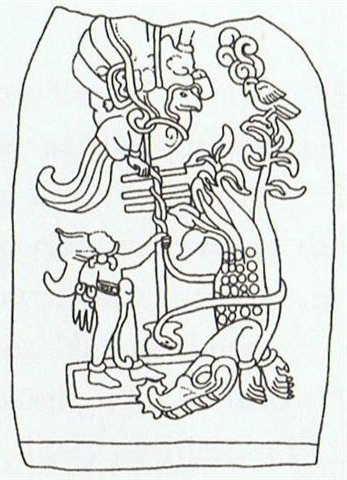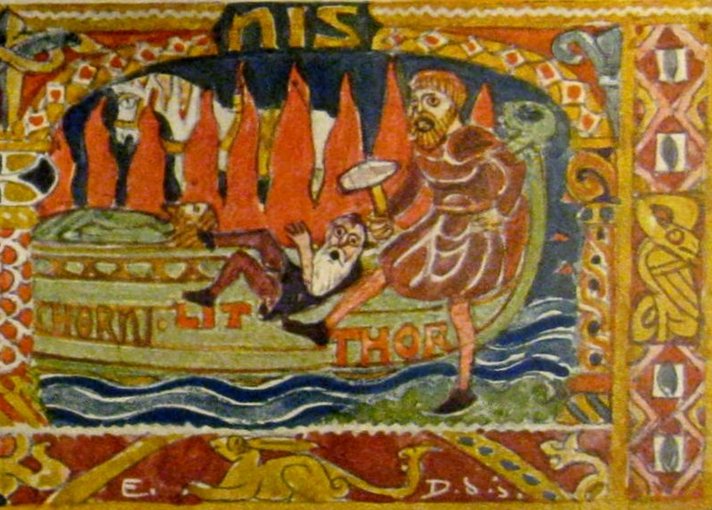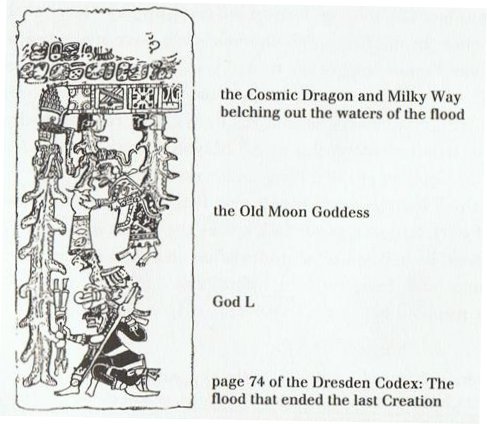Ba3.5 The word atariki (Ba3-6) is obscure. It is the word I earlier had chosen (inspired by Metoro) to refer to a variant of the ariki (king) glyph.
The main difference seems to be that whereas ariki is looking ahead atariki has stopped to look at us. I suggest atariki should be understood as a king standing still like the sun at solstice. And the flowing hair of ariki in my type example above could illustrate the flames flowing from the back of the head of the Sun:
... The bereaved and sorrowing Isis, meanwhile, wandering over the world in her quest - like Demeter in search of the lost Persephone - came to Byblos, where she learned of the wonderful tree. And, placing herself by a well of the city, in mourning, veiled and in humble guise - again like Demeter - she spoke to none until there approached the well the handmaidens of the queen, whom she greeted kindly. Braiding their hair, she breathed upon them such a wondrous perfume that when they returned and Astarte saw and smelt the braids she sent for the stranger, took her into the house, and made her the nurse of her child. The great goddess gave the infant her finger instead of breast to suck and at night, having placed him in a fire to burn away all that was mortal, flew in the form of a swallow around the pillar, mournfully chirping. But the child's mother, Queen Astarte, happening in upon this scene, shrieked when she spied her little son resting in the flames and thereby deprived him of the priceless boon ... Poki atariki means eldest child, first-born.
If Metoro was mentioning atariki at Ba3-6 in order to refer to the 'Fore Spout', we can exped a 'Rear Spout' glyph to come 16 right ascension days later, viz. at Sirrah. 16 right ascension days was the measure of the Mesopotamian inundated Field and 364 - 16 = 348 (where 3 * 48 = 144 and 34 * 8 = 272 = 2 * 136, and 348 = 12 * 29 as in the number of glyphs on side b of the C tablet).
But the Sun turned around the Earth in 364 + 1¼ = 365¼ days, and there should therefore be room for also a 'zero' day + a fraction (a 'dwarf'):
... According to Gylfaginning, following the murder of Baldr by Loki, the other gods brought his body down to the sea and laid him to rest on the ship. They would have launched it out into the water and kindled a funeral pyre for Baldr but were unable to move the great vessel without the help of the giantess Hyrrokkin [→ Hurricane], who was sent for out of Jötunheim. She then flung the ship so violently down the rollers at the first push that flames appeared and the earth trembled, much to the annoyance of Thor. Along with Baldr, his wife Nanna was also borne to the funeral pyre after she had died of grief. As Thor was consecrating the fire with his hammer Mjolnir, a dwarf named Litr began cavorting at his feet. Thor then kicked him into the flames and the dwarf was burned up as well ...
This place seems to be the 'harbour' (haga) of Huki (a constellation): ... There was noise at night at Marioro, it was Hina beating tapa in the dark for the god Tangaroa, and the noise of her mallet was annoying that god, he could endure it no longer. He said to Pani, 'Oh Pani, is that noise the beating of tapa?' and Pani answered, 'It is Hina tutu po beating fine tapa.' Then Tangaroa said, 'You go to her and tell her to stop, the harbour of the god is noisy.' Pani therefore went to Hina's place and said to her, 'Stop it, or the harbour of the god will be noisy.' But Hina replied, 'I will not stop, I will beat out white tapa here as a wrapping for the gods Tangaroa, 'Oro, Moe, Ruanu'u, Tu, Tongahiti, Tau utu, Te Meharo, and Punua the burst of thunder.' So Pani returned and told the god that Hina would not stop. 'Then go to her again', said Tangaroa, 'and make her stop. The harbour of the god is noisy!' So Pani went again, and he went a third time also, but with no result. Then Pani too became furious with Hina, and he seized her mallet and beat her on the head. She died, but her spirit flew up into the sky, and she remained forever in the moon, beating white tapa. All may see her there. From that time on she was known as Hina nui aiai i te marama, Great-Hina-beating-in-the-Moon ...
Huki. 1. Pole attached to the poop from which the fishing-net is suspended: huki kupega. 2. Digging stick. 3. To set vertically, to stand (vt.). 4. Huki á te mahina, said of the new moon when both its horns have become visible. Vanaga. 1. To post up, to publish. 2. To cut the throat (uki). Mq.: Small sticks which close up the ridge of a house. Ha.: hui, the small uniting sticks in a thatched house. Churchill. Standing upright. Barthel. M. Spit for roasting. Te Huki, a constellation. Makemson. Hukihuki. 1. Colic. 2. To transpierce, a pricking. 3. To sink to the bottom. Churchill.
(74 = 168 - 94) |
||||||||||||||||||||||||||||||||||||||||||||||||||||||||||||||||||||||||












